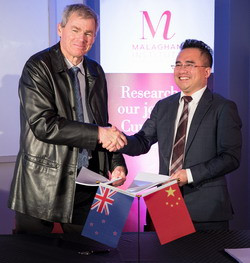A leading Chinese biotech company has partnered with New Zealand’s top independent biomedical research institute to trial and manufacture new cancer vaccines, giving New Zealanders the opportunity to access promising new treatments early.
Hunan Zhaotai Medical Group (HZMG), based in Changsha in China, and the Malaghan Institute of Medical Research today launched the new biotech joint venture Wellington Zhaotai Therapies in Wellington.
Professor Graham Le Gros, Director of the Malaghan Institute, says Wellington Zhaotai Therapies will focus on developments in a breakthrough area of oncology called CAR-T cell immunotherapy.
“This process involves taking a patient’s T cells and using a particular virus to genetically alter them to express a specific receptor – a chimeric antigen receptor (CAR) – on the cell surface. These cells are then enriched and administered to the patient to target the tumour,” says Professor Le Gros.
“Our collaborators in China have a substantial pipeline of therapies that have undergone initial clinical trials in China and are now ready to be developed under a western regulatory environment here in New Zealand; this would then lead on to international trials and regulatory approval.”
The Malaghan Institute has an international reputation as an immunology research centre, supported over the past 20 years by substantial investment from the Health Research Council of New Zealand (HRC), including $14.2 million awarded through the Capability in Independent Research Organisations Fund, and MBIE Pre-Seed Accelerator Funding administered by the Kiwi Innovation Network (KiwiNet) to support the development of this partnership.
“We have always treated our success gaining government funding as a badge of honour given the high calibre of competition for funding within New Zealand. This track record of investment was a key element in demonstrating our ability to deliver to our partners in China, along with the support we receive from our generous philanthropic donors,” says Professor Le Gros.
HRC Chief Executive Professor Kath McPherson says this exciting new development shows how long-term health research investment can have huge health and economic benefits for New Zealanders and New Zealand.
“This partnership will bring cutting-edge new cellular therapies into New Zealand, providing access to some very promising new treatments. It will also attract offshore investment into New Zealand R&D, and pave the way for more collaborations with China who will be an increasingly influential force in health research in the coming years,” says Professor McPherson.
KiwiNet CEO Dr James Hutchinson is excited about the potential for this venture to accelerate the transformation of research discoveries to marketable products for New Zealand.
“Improving researchers’ links with experienced private sector partners such as HZMG will undoubtedly strengthen the commercial capabilities of New Zealand’s scientists,” he says.
